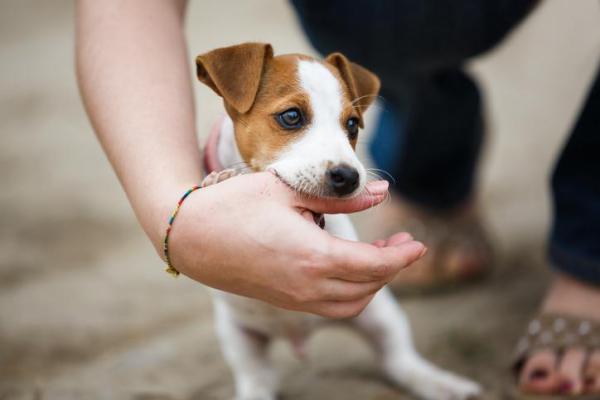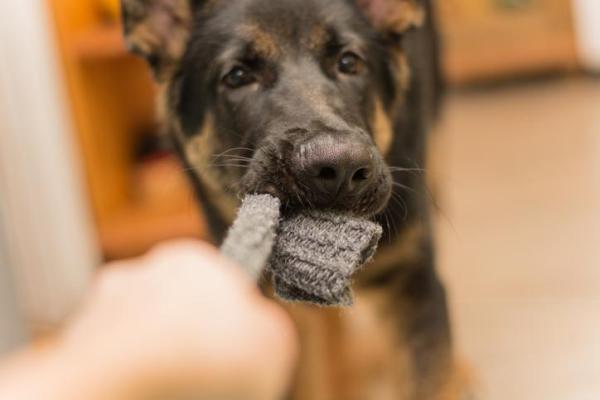
We're sure that playing with your dog is one of your favorite activities, be it a puppy or an adult dog. Play not only strengthens the bond between canine and human, but also constitutes as good exercise for both, allowing for a way to take advantage of time spend together having fun.
Sometimes a dog can start to bite, nip or mouth during playtime and although this seems harmless at first, it can eventually become a problem. If your canine becomes accustomed to biting or nipping you, there is a possibility that they will do it to others, which can be dangerous. That is why here at AnimalWised we want to explain to you why your dog bites you when playing and how to stop it.
Normal behaviour in puppies
The puppy stage is the period of greatest activity in a dog's life. Games, races and mischief is the order of the day, as well as exploration and discovery of new things. Biting is common and beneficial for puppies, either among siblings of the same litter or with human partners. It is considered positive, healthy and good for a puppy.
However, when a puppy is more than 3 weeks old, it is time to start working on inhibiting the bite to prevent it from becoming accustomed to this possibly dangerous habit, which in the long run can become a problem. It may somewhat of an over-exaggeration , but what today seems fun or insignificant for a dog, becomes unwanted behavior when they reach adulthood.
It is necessary for a puppy to bite. Because of the discomfort teething brings to gums, a puppy tries to alleviate irritation by biting everything he finds at home. In addition, as with babies, biting is one of the ways in which a dog explores the world around him.
Guidelines to follow:
To start working on managing the bite in puppies, it is essential to understand that our little ones need to bite, it is essential that our dog has toys that allow it to nibble . Each time the puppy plays with these specific objects it is important to reinforce it positively with a "very good", a caress and even a treat.
Try not to overexcite your dog in moments of play, when a dog is too excited there is more opportunity for an uncontrolled bite. On the other hand, neither must we scold the puppy if he ends up biting our hands. Punishment inhibits the dog's behavior and in the long run can lead to a delay in learning. Instead, follow these guidelines step-by-step to manage your puppies nipping:
- When you are playing and your puppy bites you, make a small squeal of pain and move away from him, ending the game for about 2-3 minutes.
- Play with the puppy again and if he keeps biting you, show pain again and turn away again. The idea is that the dog will eventually associate biting with the end of the game.
- Keep practicing this exercise and after some repetition you can start to use commands such as, "let go" or "leave." Each time the dog bites, start teaching it basic obedience at the same time.
- Reinforce appropriate games and use dog toys when playing, to reinforce correct associating of biting.
Apart from this small exercise to help introduce bite inhibition, it is beneficial to channel the puppy's stress with daily activities, adequate sleep hours and game time.

Accumulated stress
All dogs, like humans, have small peaks of stress during the day that should be channeled through exercise and activities. Stress in dogs can appear after a fight, after barking at another dog and even due to boredom.
A bored dog, no matter how old he is, will do whatever it takes to drain all the energy they have accumulated. This can translate into a somewhat violent way of playing, either by causing house damage or biting of hands when you entertain them.
Guidelines to follow:
There are several remedies to reduce stress in dogs, such as the use of synthetic pheromones. However, ensuring that our dog begins to reduce their stress levels is essential, and here are some tips on how to do that:
- Avoid stimuli that cause stress as much as possible. If, for example, your dog reacts badly to other dogs, try to walk it during quieter hours to avoid its stress and anxiety levels from increasing.
- Positively reinforce calm and relaxed attitudes (lying down, showing calm, doing things slowly), both inside and outside of the home. You can use treats and complement your dog using sweet words in a high tone like "very good" or "good boy/girl".
- Have your dog practice physical exercise on a daily basis. You can use a ball or a Frisbee to play. If you see that it excites your dog too much, go for a mountain walk or a long visit to the park.
- Although it may be surprising, sniffing games are much more tiring than physical exercise for a dog. We encourage you to practice small games or buy an intelligence toy.
Now that you know some guidelines to apply to stressed dogs do not hesitate to start practicing them, you should begin to observe a real change in a few days.
Toy Protection
Some dogs develop a sense of excessive possession towards the objects they consider theirs, or even towards some people. When this happens, it is not surprising that, during the game, the dog acts aggressively if it sees that you take one of its toys, or that it tries to bite a person or a dog that approaches the toy.
Guidelines to follow:
The protection of resources is a behavioral problem which is considered quite serious if not controlled. This problem should be managed with or by a professional, such as a canine educator or an ethologist. We can also work with the "quiet" and "leave it" commands in order to avoid conflicting situations, but the truth is that you will need behavior modification sessions or consider the complete removal the toy to avoid conflict.

The predatory instinct in dogs
Dogs still obtain behavioral patterns typical of their species, and among them is the hunting instinct. Even the dogs which we consider to be the meekest of them all have it, as it is something inherent to the species. This instinct is noticeable especially during a game or when the dog is observing objects and living beings in motion.
When the predatory instinct changes to predatory aggression it becomes time to assess the risk of the situation. This is specifically relevant if your canine starts attacking or launching against bicycles, children, adults or other dogs.
Guidelines to follow:
Basic strict obedience is key. It will be necessary to apply behavior modification sessions to work on a dog's motivation, impulsivity and aggressiveness. It is important to note that this behavior will always be inherent in the canine species, it is highly important to control and manage it.
We recommend using a secure harness and strap in public spaces and to never allow children or strangers to play with the dog, unless completely trained. In serious cases we recommend the use of a muzzle in public places.
A dog in pain- frequent cause of aggression
A dog that is suffering from pain often reacts aggressively, even when playing. If a dog has never been violent before and suddenly shows aggressive attitude, we recommend immediate attention. This aggressive behavior is apparent if we touch the sensitive area which causes the dog to react negatively or even violently.
Guidelines to follow:
Observe your dog to see if it is suffering any pain and we recommend going for a visit to your veterinarian to rule out any pathology. If your dog is in pain, keep children from bothering the canine and allow them peaceful and respected space while following doctor's instructions.

Aggression from fear
Fear manifests as different triggers in a dog. When a dog is faced with a situation that results in fear, such as excessive noise or a new object, if it feels it cannot escape or avoid the conflict, your dog will feel anxious and react. If you notice that your dog adopts fear postures when you play, you may find yourself facing a case of aggression from fear.
Guidelines to follow:
The first step will be to identify the stimulus that causes the fear, for example: a specific toy, your hand up, a scream or something that is too close. It may take some time to identify what is causing the fear but once you identify it, it will easier avoid it and start working progressively with an educator.
Maternal instinct
A female dog who has just given birth and is in the process of caring for her puppies will be sensitive to the presence of strangers or her owners. If for example she is with her puppies and you try to get close to her, even to give her love or play with her, she may believe that you will harm her litter. This situation will most likely be when maternal aggression might occur.
Guidelines to follow:
It is not necessary to react immediately after the birthing process, this protective behavior should cease as the puppies grow older. However, if you consider it important to approach the litter soon after the mother has given birth, you should do this gradually:
- Start by speaking to her calm voice at a prudent distance, allowing your dog not to feel the need to react or become excessively alert.
- Prevent unknown persons from approaching or disturbing. Ideally, your dog will understand that you are trying to protect her.
- You could throw your dog some tasty prizes such as chicken, cheese or frankfurter (make sure this is donw from a distance)
- Start working on approaching your animal slowly: one step forward, one step back while you continue using prizes that throw at a safe distance.
- Do not be invasive and be patient. This approaching exercise may take days to work, the most important thing is that your dog allows for it and feels calm.
- Repeat and always reinforce, even if your dog already tolerates your presence quite well.
Finally, we remind you that post-partum is not the best time to play games with your dog,she will likely refuse to play as she is dedicating her time and energy to her puppies.

If you want to read similar articles to Why Does My Dog Bite Me When Playing?, we recommend you visit our Behavioral problems category.